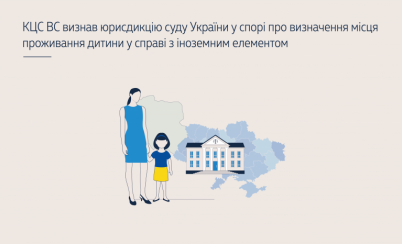Contact center of the Ukrainian Judiciary 044 207-35-46

Since the child was born and resided in Ukraine, is a citizen of Ukraine, at the time of filing a lawsuit and opening the proceedings in the case, she lived in Poland for a short time - Ukraine remained her habitual place of residence. Therefore, the dispute over determining the child's place of residence is subject to the jurisdiction of the Ukrainian courts.
This conclusion was reached by the Supreme Court as part of the panel of judges of the First Judicial Chamber of the Civil Cassation Court.
A mother filed a lawsuit against her ex-husband, in which she asked to determine the place of residence of her minor child with her in Kyiv. After the divorce, the child remained living with her mother in Ukraine, and due to the military aggression of the Russian Federation against Ukraine, they moved to Poland. The plaintiff claimed that the child could not return to Ukraine due to the position of the defendant, a Polish citizen, who believed that the child should reside in Poland in the future.
The court of first instance closed the proceedings on the basis of para. 1 of part 1 of Article 255 of the Civil Procedural Code of Ukraine, stating that the plaintiff and her daughter had changed their place of habitual residence from Ukraine to Poland. The court took into account the length of the child's stay in this country, the fact that she attended a preschool in Warsaw, and the fact that the child has Polish citizenship, etc. Therefore, guided by the provisions of Articles 5 and 6 of the 1996 Convention on Jurisdiction, Applicable Law, Recognition, Enforcement and Co-operation in respect of Parental Responsibility and Measures for the Protection of Children (Hague Convention on Parental Responsibility 1996), the court found that the Ukrainian court lacked jurisdiction to resolve the dispute in this case.
The court of appeal cancelled the decision of the district court and sent the case back to the court of first instance for further consideration. The court proceeded from the fact that at the time of filing the claim and opening the proceedings, there was no circumstance defined in paragraph b) of part 1 of Article 7 of the Hague Convention on Parental Responsibility of 1996, as the child had not lived in Ukraine for less than one year. Within one year of the child's departure to Poland, a claim was filed to determine the child's place of residence with the mother in Ukraine.
The CivCC of the Supreme Court amended the reasoning part of the court of appeal's ruling, making the following legal conclusions.
The jurisdiction of the Ukrainian courts in civil cases with a foreign element is determined by the Civil Procedural Code of Ukraine, a law or an international treaty ratified by the Verkhovna Rada of Ukraine (Article 497 of the Civil Procedural Code of Ukraine).
The jurisdiction of the Ukrainian courts over cases with a foreign element is determined at the time of commencement of the proceedings, despite the fact that the grounds for such jurisdiction have disappeared or changed during the proceedings (part 1 of Article 75 of the Law of Ukraine ‘On Private International Law’).
The provisions of Article 7 of the 1996 Hague Convention on Parental Responsibility, when determining the jurisdiction applied by the court of appeal, apply only in cases of unlawful removal or retention of a child. However, the case file does not contain evidence that the child was unlawfully transferred from the territory of Ukraine to the territory of Poland.
In this regard, the jurisdiction of the case should be determined in accordance with para. 1 of Article 5 of the Hague Convention on Parental Responsibility of 1996, depending on the child's habitual residence, which is established on the basis of the circumstances of each particular case.
At the time of filing the lawsuit, the child was 5 years and 4 months old, of which 4 years and 6 months she had lived in Ukraine and 10 months in Poland. In addition, the child had been attending kindergarten in Ukraine for almost 3 years and in Poland for about 2 months.
The CivCC of the Supreme Court took into account the provisions of Article 28 of the Treaty between Ukraine and the Republic of Poland on Legal Assistance and Legal Relations in Civil and Criminal Matters, according to which the legislation of the Contracting Party of which the child is a citizen is applied in legal relations between parents and children.
It was established that the case file did not contain any evidence of a dispute over the child's place of residence in the courts of the Republic of Poland.
Given that the child was born in Ukraine, lived in Ukraine until February 2022 and is a citizen of Ukraine, at the time of filing this lawsuit and opening the proceedings, she did not live in Ukraine for a short period of time, Ukraine remained her habitual place of residence. The court of appeal came to a generally reasonable conclusion that the jurisdiction of the Ukrainian courts was extended to this dispute and cancelled the ruling of the first instance court, which prevented further proceedings in the case.
Resolution of the Supreme Court of 31 July 2024 in case No. 760/18630/22 (proceedings No. 61-6796св24) - https://reyestr.court.gov.ua/Review/120785009.
This and other legal opinions of the Supreme Court are available in the Database of Legal Positions of the Supreme Court - https://lpd.court.gov.ua.